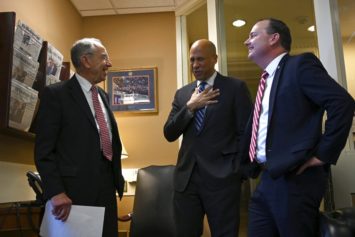African-Americans have made significant gains over the past 50 years in educational attainment and in decreasing their numbers living in poverty, but have only closed the income gap with whites by 7 percent, according to a new study by the National Urban League.
The Urban League study, timed to commemorate the 1963 March on Washington, reveals that for every black person who made it to college in 1963, there are now five blacks receiving higher education. In addition, the number of blacks living in poverty has decreased by 23 percent. But on the minus side, despite the gains made, there is still the significant gap with whites.
“There has been important progress in the last 50 years: decrease in poverty, increases in high school graduation rates and enrollment rates,” said Urban League President Marc Morial at a news conference on Capitol Hill. “But the disparity between black America and white Americans when it comes to jobs, income, health care and wealth remain too large.”
The Urban League plans to use the report’s findings to push Congress to pass a jobs bill.
“It’s without contradiction that African-Americans have made extraordinary progress in the State of Black America report,” said Rep. Chaka Fattah (D-Pa.), who is sponsoring an urban jobs bill in the House that is strongly supported by the Urban League. “But compared to the majority, we still have some room to grow.”
“Passing a jobs bill is our number one priority,” said Rep. Marcia Fudge (D-Ohio). “If we can get people to work that would solve an awful lot of problems. No matter what the president wants to do, it still has comes to Capitol Hill. We are still are the people who ultimately need to move that agenda.”
In an appearance on NPR to discuss the report, Nancy Ditomaso, a professor of Management and Global Business at Rutgers University, said her research suggests a big reason blacks still lag behind whites in employment is because most people get jobs from personal contacts and connections.
“One of the startling things that I found was that 99 percent of the people that I talked to got 70 percent of the jobs that they held over their lifetimes with getting some kind of help from family, friends, acquaintances, in terms of getting inside information, having someone use influence on their behalf, or someone who could actually offer them a job or an opportunity,” she said in an appearance on Michel Martin’s show, “Tell Me More.”
“When you have almost every job that people get over their lifetimes with that kind of inside help, it raises questions about what actually is the job market, if most jobs, in fact, are not available to just anyone out there, but is available to primarily someone who has an inside edge,” Ditomaso said. “Most people get jobs because whites are helping other whites get jobs, as opposed to trying to keep blacks out of jobs—at least in the post-civil rights period. And that difference is very important because discriminating or excluding people from jobs is illegal. But helping friends or family members or acquaintances get a job is not illegal.”
“I think that everyone tries to help their family and friends to the extent that they can do so—non-whites as well as whites. But because whites on average disproportionately hold better jobs with more authority, jobs that provide more benefits, training opportunities and so on, when whites are primarily helping other whites, that obviously gives them disproportionate advantages compared to those that don’t have those kinds of connections,” she said.
Ditomaso said her research has found that blacks may also be less willing to help each other.
“Some of that research has found that blacks don’t help each other as much as one might expect, not so much because they think of it as favoritism. Some of the research has suggested perhaps because they might feel somewhat more vulnerable; if they help a friend get a job and that friend doesn’t do well, then it might reflect badly on them,” she said.


